Ethiopian is one of Africa’s fastest growing airlines, and from an outsider’s perspective they seem to almost be taking an Emirates-esque approach towards growth, trying to make Addis Ababa a hub for connecting flights between other points in the world (Addis Ababa’s Airport is nothing like Dubai’s Airport, however).

Duty free shopping at Dubai Airport (that’s a $200,000 bottle of scotch)
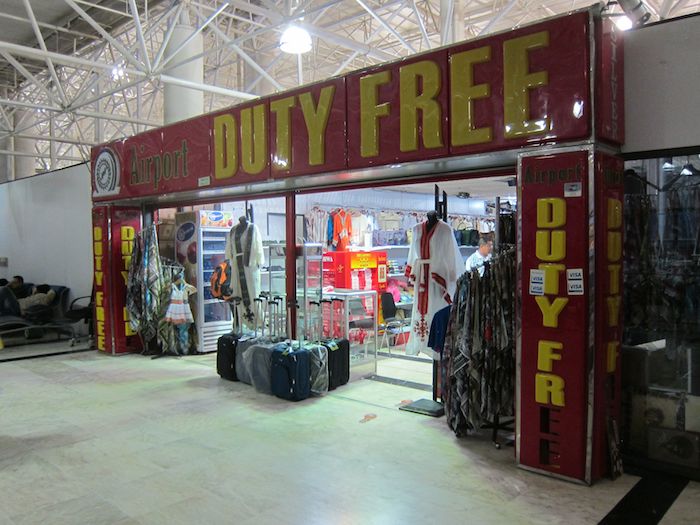
Duty free shopping at Addis Ababa Airport
The one challenge standing in their way (aside from their location, which isn’t all that convenient unless you’re connecting to Central or East Africa), is that Addis Ababa is at a high altitude, meaning the airline is heavily restricted in terms of maximum flight length due to the challenges of taking off at such a high altitude.
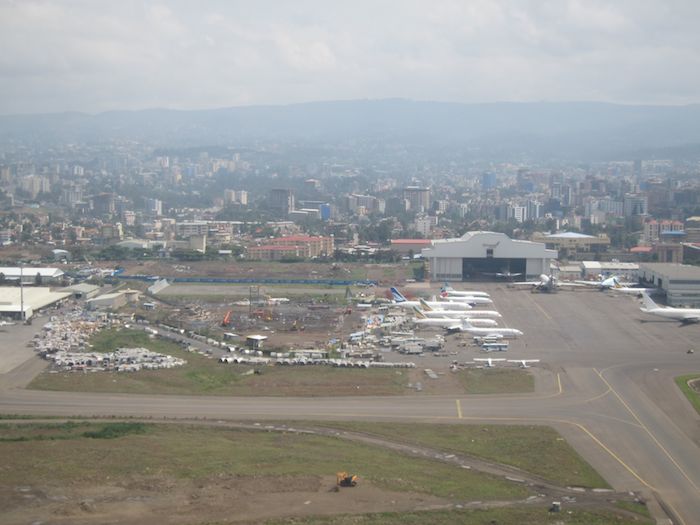
Taking off from Addis Ababa Airport
Ethiopian’s current North America destinations include Los Angeles, Toronto, and Washington DC:
- For their flights between Los Angeles and Addis Ababa, the plane stops in Dublin both ways, and Ethiopian has pick up rights there, meaning you could fly Ethiopian exclusively between Los Angeles and Dublin
- For their flights between Toronto/Washington and Addis Ababa, the eastbound flight is nonstop, while the westbound flight stops in Dublin for refueling; Ethiopian doesn’t have pick-up rights, meaning everyone has to stay on the plane
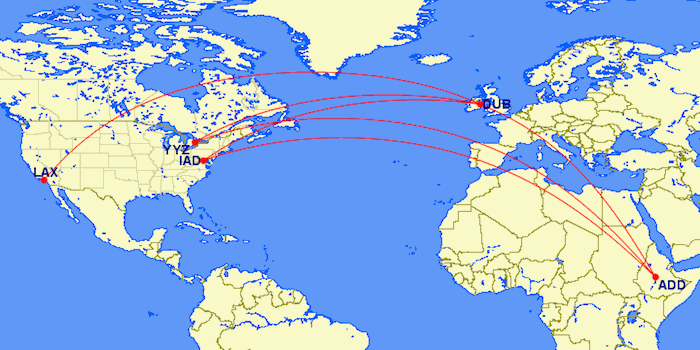
Ethiopian’s current routes to North America
Interestingly Ethiopian is planning some further US expansion. Per the CAPA Centre for Aviation, Ethiopian will be adding flights to New York in June 2016, and is considering launching flights to Chicago and Houston in 2017.
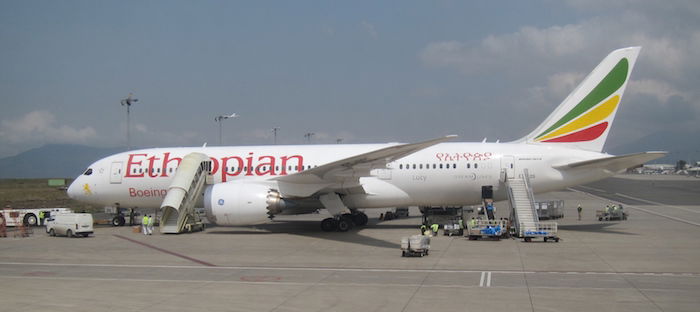
Ethiopian 787
Not surprisingly, all the cities they fly to in North America (and are considering flying to) are Star Alliance hubs, which allows them to not just serve local markets, but also connecting passengers. My guess would be that Ethiopian’s new flight to New York would be to Newark Airport rather than Kennedy Airport, though I could certainly be wrong.
That’s some impressive growth from an airline which has doubled their longhaul fleet in just four years, and plans to double it again in the next 10 years.
The interesting question with Ethiopian’s North America growth is whether they’ll continue to use Dublin as a connecting point for these flights. While it seems to be necessary as a fuel stop on westbound flights, could Ethiopian actually find a market in serving passengers traveling between the US and Dublin?
Ethiopian has not yet decided if it will serve its three planned new US destinations non-stop eastbound or with a stopover in both directions, which would enable it to take advantage of fifth freedom traffic. “We are now measuring the size of the traffic whether it makes sense to fly direct from or need to stop in Europe,” Mr GebreMariam said. “If the market is not big enough to begin with then we can stop both ways in Dublin.”
Ethiopian has apparently been doing well on their new Los Angeles to Dublin flight, having achieved load factors of 75-80%:
The new Addis Ababa-Dublin-Los Angeles flight has performed well since it was launched in Jun-2015, giving Ethiopian confidence it can succeed in other Dublin-US markets. Ethiopian achieved an average load factor on the Addis Ababa-Dublin-Los Angeles route of 75% to 80% in the summer 2015 season with a significant number of passengers embarking or disembarking in Dublin.
Assuming Ethiopian does indeed open up these new routes and actually have pick-up rights in Dublin, it’s possible that a majority of their traffic would just be between the US and Dublin.
After all, there’s not much additional demand between Dublin and Addis Ababa. They already operate it once daily with pick-up rights, and I doubt demand would triple if they had three (or more) flights a day between Dublin and Addis Ababa.
So if they are indeed largely transporting passengers between the US and Dublin, aren’t they guilty of operating in a similar fashion to what the US carriers accuse the “big three” Gulf carriers of? Quadrupling longhaul capacity in 14 years isn’t exactly reflective of the market. But of course the US carriers don’t feel nearly as threatened by Ethiopian as they do by Emirates, Etihad, and Qatar, so I doubt we’ll see them wage that battle.
Bottom line
All things considered I quite enjoyed my flights on Ethiopian, and am excited to see them grow. Their US growth strategy is interesting, especially if they eventually end up operating a mini hub out of Dublin, where much of their traffic might just be for transporting passengers between the US and Europe.
Stopping in Dublin could almost make sense exclusively from an operating cost perspective, as fuel costs are significantly lower operating two ~7 hour flights rather than one ~14 hour flight. So any additional traffic they get would be the icing on the cake. What it comes down to is whether the stop would deter people from booking Ethiopian, especially if they’re connecting beyond Addis Ababa.
Do you see a future for Ethiopian essentially operating a mini hub out of Dublin for transatlantic flights?

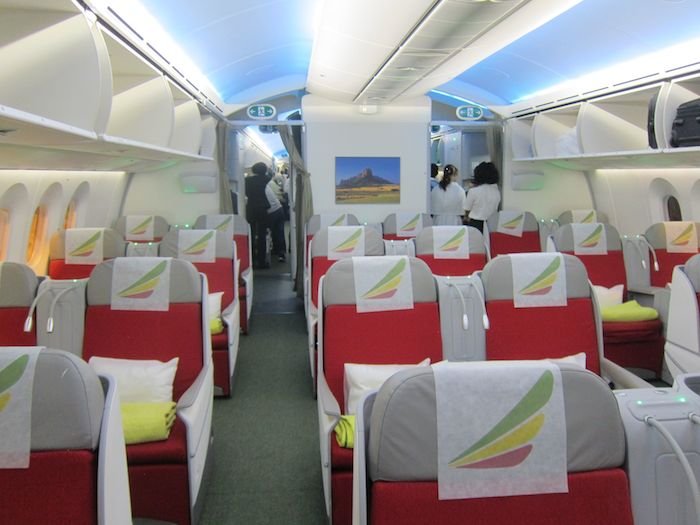




@markiteight
Might not be gone yet from Paine Field, ET would need to arrange for engines and interior plus crew training. Will probably be phased in over the next couple of years hence starting flights in 2016 and 2017.
http://airwaysnews.com/blog/2015/06/17/paris-air-show-ethiopian-takes-terrible-teens-787s-from-boeing/
They should have a stop in LIS. It is also a *A hub, which would give them connectivity if they had fifth freedom rights. Don't know about the costs of fuel and landing fees, though
"Also ET recently bought a number of early produced 787’s (aka the terrible teens) that have been stored since the 787 program started from Boeing at a steep discount.
Due to extra weight in plane body from rework need to get the planes up to the 787 spec used for FAA certification these planes also have about 1000nmi less range than other 7"
Oh really? That's interesting. I fly out of Paine Field where the...
"Also ET recently bought a number of early produced 787’s (aka the terrible teens) that have been stored since the 787 program started from Boeing at a steep discount.
Due to extra weight in plane body from rework need to get the planes up to the 787 spec used for FAA certification these planes also have about 1000nmi less range than other 7"
Oh really? That's interesting. I fly out of Paine Field where the 787 is built. As you said there were a number of aircraft that came off the assembly line before these revisions were made and they set them aside until there was enough slack in the production schedule to run them back through the line. That was YEARS ago and those planes never went back into the plant. The only problem is even at a place like Paine Field, home to the worlds largest (by volume) building, there isn't enough room to store a bunch of wide body aircraft except on one of the runways. So since I began my flight training the crosswind runway, 11/29, has had a half dozen engineless 787s (and a couple of 747-8s, but those are gone now) stacked nose-to-tail. They can be seen here: https://www.google.com/maps/place/Paine+Field+Airport/@47.9070334,-122.2837673,878m/data=!3m2!1e3!4b1!4m2!3m1!1s0x54900159b82b97fd:0x4e3571c12e342514!6m1!1e1 (funny...I can tell what day that image was taken. There was one day when for some reason all our Cessna 172s ended up parked facing the opposite direction they normally do, and that's how they're parked in that image.)
I haven't been up there in over a month so I'll be curious to see if they're gone. It'll be weird having a crosswind runway (although I understand they hardly ever used it before it was converted to a parking lot). As a student pilot it's actually been quite advantageous not having use of 11/29. I've become rather proficient at crosswind landings.
@Endre
There is also how much crew is needed. 7H could be done with flight crew of 2, while 14H would probably require 3. Crew costs is also a factor, and might be cheaper if they can do a crew change in DUB.
Have read that around 12H of flight time is the point after which cost go up significant with today's airplanes.
Also ET recently bought a number of early produced 787's (aka the...
@Endre
There is also how much crew is needed. 7H could be done with flight crew of 2, while 14H would probably require 3. Crew costs is also a factor, and might be cheaper if they can do a crew change in DUB.
Have read that around 12H of flight time is the point after which cost go up significant with today's airplanes.
Also ET recently bought a number of early produced 787's (aka the terrible teens) that have been stored since the 787 program started from Boeing at a steep discount.
Due to extra weight in plane body from rework need to get the planes up to the 787 spec used for FAA certification these planes also have about 1000nmi less range than other 788's.
It is better to have stopover in other European cities to improve the connection time from Asia, with battle the 3 MEs.
Does nobody remember that ET used to already serve Newark in 2004-5 but pulled out to focus on IAD instead?
Do these flights allow you to clear immigration in Dublin? So the whole plane lands as a domestic arrival in the US. If that's the case it would have a massive selling point, like the all business BA001 flight from LCY to JFK, which stops in Shannon to refuel and clear customs.
"Quadrupling longhaul capacity in 14 years isn’t exactly reflective of the market"
I REALLY despise seeing analysis like that - it's all over the "normal" media too!
No, quadrupling in 14 years isn't reflective - but quadrupling from a small number to a bigger small number is hardly astronomical growth. If Ethiopian only grew at "reflective rates" then they'd be waiting decades to get anywhere.
As they say, you can distort stats to say anything you want them to!
Pick up rights? Surely Ben's intern must have written this. Ben would have used the correct term: fifth freedom rights.
@Endre, you're correct that takeoff and climb consumes significantly more fuel than high altitude cruise settings, but on long haul flights the majority of fuel is consumed at cruise, the bulk of the flight time. I had to think about Lucky's claim for a moment as well, because all things being equal two 7 hour flights would consume more fuel than one 14 hour flight for the reasons you state. But all things aren't equal....
@Endre, you're correct that takeoff and climb consumes significantly more fuel than high altitude cruise settings, but on long haul flights the majority of fuel is consumed at cruise, the bulk of the flight time. I had to think about Lucky's claim for a moment as well, because all things being equal two 7 hour flights would consume more fuel than one 14 hour flight for the reasons you state. But all things aren't equal. On a 14 hour flight the aircraft has to cary 14 hours worth of fuel, plus the required trans-oceanic and IFR reserves, which depending on the aircraft means the tanks are probably filled to the brim. This means the aircraft is at its MTOW and is flying heavy for most of the flight, requiring more fuel on takeoff, cruise climb, AND level cruise power settings. Split that flight in two and the aircraft need only cary half the fuel load plus the legally required reserves. The significant reduction in weight and the associated reduction in fuel consumption far outweigh the fuel consumed during the second takeoff/climb.
@lucky, you state " fuel costs are significantly lower operating two ~7 hour flights rather than one ~14 hour flight. ". Just curious. Aren't take offs and climbs to altitude use most of the fuel? Would the 14 hours flight with one take off use much less fuel than two 7 hours flights with two takeoffs?
Ben;
My understanding is that Dublin is used because of restrictions at Addis, due to its height & hot climate. Before Ethiopian started using DUB as a stop, the company had a similar tech stop at Rome, Italy. The DUB-LAX dynamic will change when Aer Lingus commence their Dublin-LAX route.
Michael